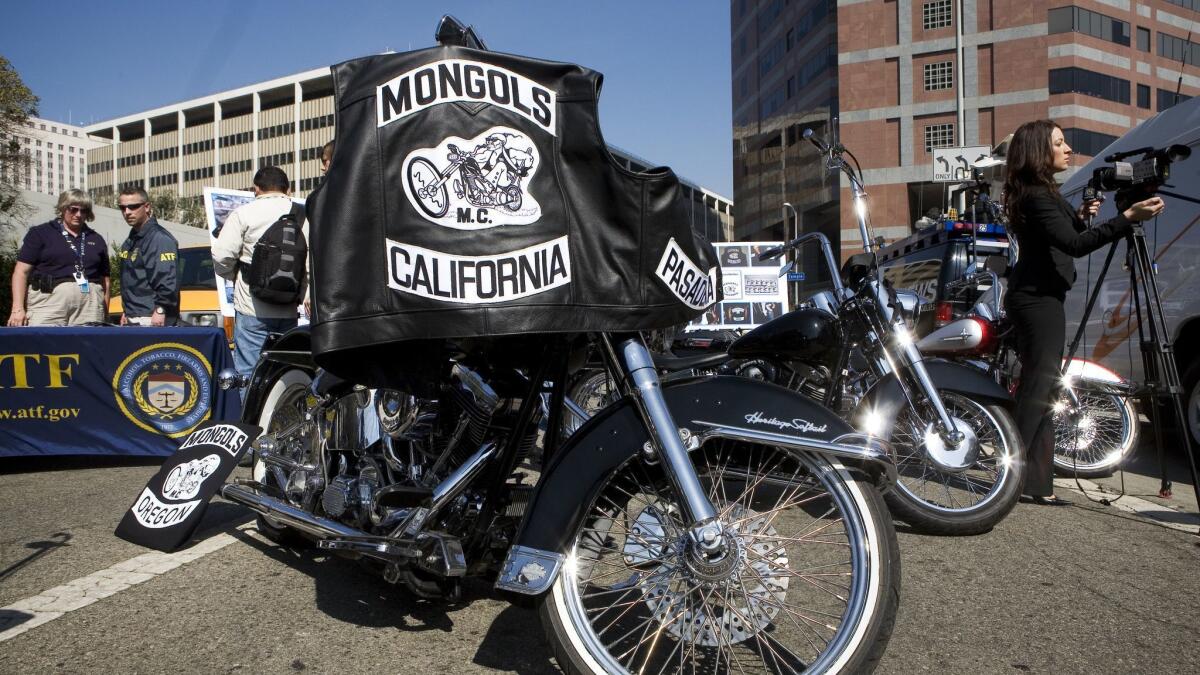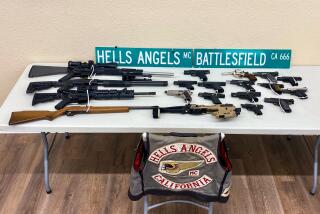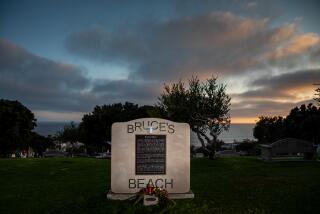Jury orders Mongols motorcycle club to forfeit logo trademarks

- Share via
On California’s freeways, in biker bars and during not-infrequent clashes with other outlaw motorcycle clubs, members of the Mongols are easily identified.
They are the ones in the leather vests and jackets adorned on the back with the distinctive image of a Genghis Khan figure in sunglasses riding a motorcycle beneath the group’s name, spelled out in large block letters.
Since the group was formed in late 1960s, the logo has been a potent element of the Mongols’ identity, which over the years has included an unmistakable penchant for drug dealing and violence by many members. Only those who have been admitted to the inner ranks of the insular group are allowed to stitch the large patches of the insignia onto their riding apparel. And in the closed-off world of motorcycle clubs, built largely around rivalries and alliances with other groups, the logo is an unmistakable totem.
The ability of Mongols leaders to use their image was dealt a blow Friday when a federal jury in Santa Ana decided the club should be stripped of the trademarks it holds on its coveted logo as punishment in a racketeering case.
The verdict, however, set up a 1st Amendment showdown over the right of the club’s members to express themselves.
Last month, at the end of a lengthy trial, the same jury convicted the Mongols motorcycle club of racketeering and conspiracy charges, finding the group shared responsibility for murder, attempted murder and drug crimes committed by individual members.
The verdict allowed prosecutors from the U.S. attorney’s office to pursue something they had long sought: a court order forcing the Mongols to forfeit the trademarks as part of its sentence.
The jury returned this week to hear a day of testimony and arguments from prosecutors and the Mongols’ defense attorney on the forfeiture issue. The panel had to decide whether the logo was linked closely enough to the crimes for which the Mongols organization had been convicted to warrant forcing the club to forfeit the trademarks to the U.S. government.
After two days of deliberating, it decided there was, in fact, a tight nexus between the image and one of the criminal charges the club faced — conspiracy to commit racketeering.
Calling the verdict the “first of its kind in the nation,” U.S. Atty. Nicola Hanna said seizing the Mongols trademarks would serve to “attack the sources of a criminal enterprise’s economic power and influence.”
But the case is not over. U.S. District Judge David O. Carter declined to immediately order the trademarks forfeited and instead set a hearing for next month to address, among other things, thorny 1st Amendment issues raised by the verdict.
The government’s pursuit of the trademarks is a novel legal strategy, based on the idea that control of the trademarks would not only cut off the stream of money that Mongols leaders collect from selling patches and other merchandise to members but would also empower government officials to stop Mongols members from wearing any clothing with the potent Mongol image.
An effort to bar Mongols members from displaying the logo, trademark experts and constitutional scholars said, would run the risk of crossing constitutional lines set out by the 1st Amendment, which protects people’s rights to associate freely and express themselves.
“Just because you’re found to be a criminal, you don’t lose your 1st Amendment rights,” said Jeffrey Pearlman, interim director of the Intellectual Property & Technology Law Clinic at USC Gould School of Law. “What the government seems to be trying to do is prevent these people from associating with each other.”
But Erwin Chemerinsky, dean of the law school at UC Berkeley, said the government likely has the law on its side.
He pointed to a 1993 case in which a divided U.S. Supreme Court ruled the government was within its rights when it seized and destroyed all the contents in adult bookstores owned by a man who had been convicted under the same federal racketeering laws used in the Mongols case.
“I think the government’s action seizing speech should violate the First Amendment, but [the earlier case] will make the First Amendment claim difficult,” he wrote in an email.
It is not the first time concerns over the 1st Amendment have been raised in the government’s pursuit of the Mongols. A decade ago, in an earlier case, prosecutors sought authority to seize clothing bearing the Mongols’ insignia. A member of the club sued, claiming his rights under the 1st Amendment were at risk, and prevailed.
“The plaintiff’s hardship in not being able to express his views and public interest in protecting speech outweigh the government’s interest in suppressing an intimidating symbol,” the judge in that case wrote.
At the forfeiture hearing this week, Joseph Yanny, the Mongols’ defense attorney, repeatedly told jurors that taking the trademarks from the Mongols would amount to a “death penalty” for the group. And on Friday, following the verdict, he said in an interview that he would argue to Carter that the jury’s decision should be set aside in light of the 1st Amendment issues. Individual members of the Mongols, he added, are likely to file their own challenges as well.
“It should be a cold day in hell when the judge signs that order of forfeiture,” Yanny said.
The Mongols were formed in the 1970s in Montebello by a group of mostly Latino men who reportedly had been rejected for membership by the Hells Angels motorcycle gang, which has become the Mongols archrival. It has expanded over the decades to include several hundred members in chapters across Southern California and elsewhere.
The federal government has pursued the Mongols for years, along with several other biker clubs that authorities have identified as “outlaw motorcycle gangs.” Despite their claims of being innocent social clubs, the groups, which include the Hells Angels, Vagos and the Outlaws, have long track records of warring with one another and, according to authorities, operate as criminal organizations that subsist on the drug trade.
In 2008, nearly 80 Mongols members were charged in a sweeping racketeering case that included an array of alleged murders, assaults and drug deals. The charges were the culmination of Operation Black Rain, an investigation that centered on paid informants and undercover agents from the Bureau of Alcohol, Tobacco, Firearms and Explosives who infiltrated the club’s ranks.
Prosecutors devised the strategy of stripping the Mongols of its trademarks in this earlier case. At a news conference announcing the charges, then-U.S. Atty. Thomas P. O’Brien laid out the strategy, saying that taking control of the trademarked insignia would give the government the authority to force Mongols members to remove their image from their riding jackets.
All but two of the defendants in the case pleaded guilty and a judge agreed the trademark should be forfeited, but ultimately reversed himself after deciding none of the people charged in the case actually owned the trademark.
That led prosecutors to try again with a second racketeering case that was largely the same as the first but which named only one defendant: Mongol Nation, the entity that prosecutors say is made up of the club’s leaders and owns the trademark.
Follow @joelrubin on Twitter
More to Read
Sign up for Essential California
The most important California stories and recommendations in your inbox every morning.
You may occasionally receive promotional content from the Los Angeles Times.











